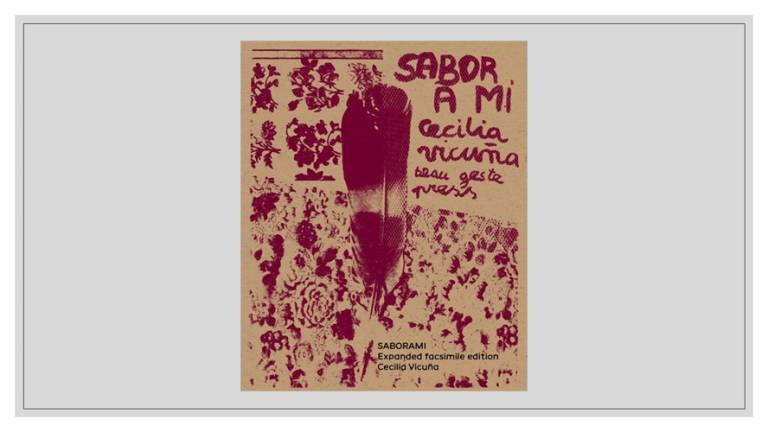Marxism in Culture Seminar Series: Cecilia Vicuña, Saborami
26 April 2024, 5:30 pm–7:30 pm

For this session of Marxism in Culture, the editors Luke Roberts and Amy Tobin will discuss Vicuña’s socialist feminism and ecological thinking, and will show some archival materials related to the book before opening out to a general Q&A
This event is free.
Event Information
Open to
- All
Availability
- Yes
Cost
- Free
Organiser
-
Institute of Advanced Studies
Location
-
IAS ForumG17, ground floor, South WingUCL, Gower St, LondonWC1E 6BT
“The search for structure in society is analogous to the
search I undertake for form in my works. The social form is
easier to find, it’s obviously socialism, self sufficient commun
ities, but it’s harder to do it. The form I search for is harder to find,
but easier to do.
Cecilia Vicuña, ‘Pain Things & Explanations’ (1971)
First published by the Devon-based Beau Geste Press in 1973, Cecilia Vicuña’s artist’s book Saborami combines poetry, prose, paintings, and assemblages. Though the book immediately responds to the fascist military junta in Chile, it also commemorates the revolutionary process of the Popular Unity movement. Vicuña makes sculptures commemorating ‘commune commandos… industrial belt organizations …agrarian reform centers’. She paints playful icons of Marx, Lenin, Castro and Allende. She records filling a room at the National Fine Arts Museum in Santiago with dried leaves, an action ‘conceived as a contribution to socialism in Chile’.
For the fiftieth anniversary of the events in Chile, Book Works have produced a new expanded edition of Saborami, edited by Luke Roberts and Amy Tobin. This includes material from the years of Vicuña’s period in London – first as student at the Slade (1972-73), then as exile (1973-75) – which situates her in relation to the Women’s Liberation Movement, the Chile Solidarity Campaign and Artists for Democracy (which she co-founded), and as a member of the international avant-garde.
Though in recent years Vicuña’s work has been recognised by major institutions, Saborami has tended to remain under-read. This is partly because it has been hard to access, especially in the UK. But it also points to a series of displacements and formal ambivalences around the production of the book. This is an ‘untranslation’ between English and Spanish; it is as expressive and erotic as it is politically committed; as mystical as it is materialist. Saborami challenges us to rethink our narratives of socialist aesthetics, conceptualism, and experimental poetry in Britain.
For this session of Marxism in Culture, the editors Luke Roberts and Amy Tobin will discuss Vicuña’s socialist feminism and ecological thinking, and will show some archival materials related to the book before opening out to a general Q&A and discussion.
Copies of the book will be available to purchase. All welcome - no registration required, just join us on the day. This event is not being live-streamed or recorded.
Image caption Cecilia Vicuña, Saborami (1973) (expanded facsimile version) Bookworks, 2024
The Marxism in Culture seminar series was conceived in 2002 to provide a forum for those committed to the continuing relevance of Marxism for cultural analysis. Both ‘Marxism’ and ‘culture’ are conceived here in a broad sense. We understand Marxism as an ongoing self-critical tradition, and correspondingly the critique of Marxism's own history and premises is part of the agenda. ‘Culture’ is intended to comprehend not only the traditional fine arts, but also aspects of popular culture such as film, popular music and fashion.
About the Speakers
Luke Roberts
Senior Lecturer in Modern Poetry at King’s College London
Luke Roberts is the author of books of poetry including Home Radio (2021), and the forthcoming critical study Living in History: Poetry in Britain, 1945-1979 (2024).
Amy Tobin
Associate Professor in the History of Art at University of Cambridge
Amy Tobin is the author of Women Artists Together: Art in the Age of Women’s Liberation (2023). She is Curator, contemporary programmes, at Kettle’s Yard.
 Close
Close

